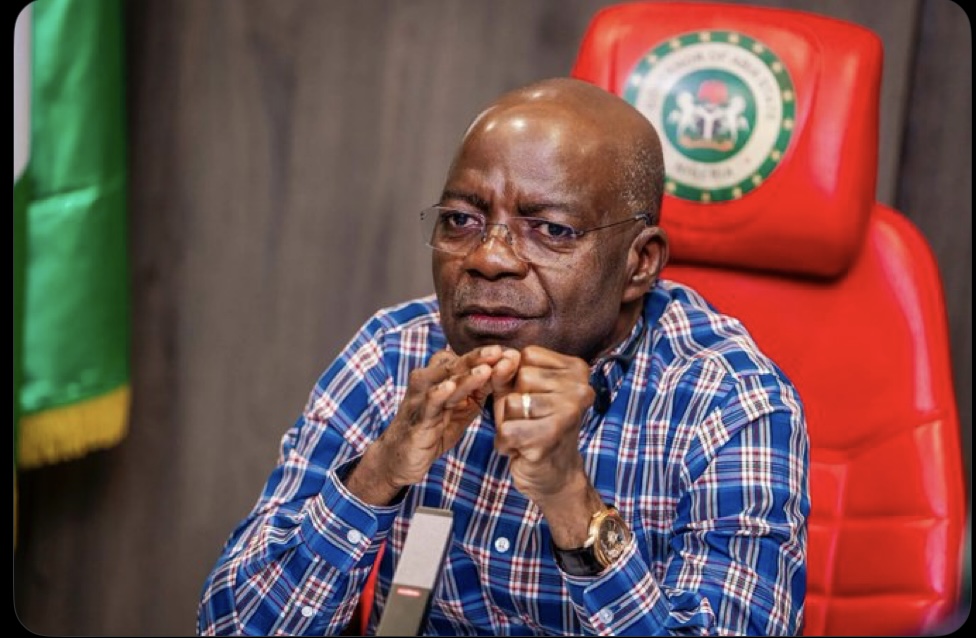From Debt to Freedom: The Tinubu Magic Wand

It is axiomatic that when the fountain is muddied, you can't get clean water downstream just like the fish starts rotting from the head. However, what is happening in the political firmament of Nigeria is a reverse logic to those aphorisms.
Like it is argued that individual capacity determines the success and development of a nation in transition like Nigeria, it has held true economically and will soon go round to other sectors of the country.
When Nigerians heard the announcement on Inauguration day of President Bola Ahmed Tinubu, that subsidy is no more, it evoked mixed feelings from friends and foes. To some, it aligned with the unsteady movement of the announcer while armchair economists dusted up their brains and started tumbling straight from economic abstracts with convoluted propositions of what should or ought to have been done.
In his characteristic style, Tinubu asked for time and understanding, insisting that he knew what he was doing and where he was leading the polity to. As is won't with new policies, it brought with it the balancer of good which is hardship but Nigerians would have none of that and they started lamentations and cursing the President for the hardship. They forgot that you can't make an omelette without breaking eggs and that pain and gain are two sides of one coin which you cannot take one and leave the other.
Fastrack to now where other Governors like line dancers are looking at the footsteps of the lead dancer and taking cues. How has that translated to reality? A look at documents from the Debt Management Office shows that Nigeria is paying off her debts accumulated by several regimes like the International Monetary Fund, IMF which has come out to acknowledge it as true, making people to wonder how come in this era of belt tightening and global tanking of economies.
Some are saying it is a product if the removal of subsidy which had attracted the highest outcry and negative analysis. Its early gains have manifested in debt freedom by Nigeria. Other debts are being serviced and repaid which signposts better days ahead.
Since President Tinubu has led the way to adroit utilisation of resources as well as responsible spending, there is no other way to go for subnationals than to follow suit. The first salvo was fired by Alex Otti of Abia State who said he had reduced the debts of the state without borrowing while also executing multi- billion Naira projects before more statistics started dropping that it was the case of all the states in Nigeria in a collective march towards debt freedom.
With a bragging right, the government can boast all it wants because there are tangibles to point at as performance indices. As one Tinubu supporter boasted on the internet, "The removal of subsidy has helped us to achieved this;
We were borrowing to pay subsidies, but now, we are paying back all the debts incurred under subsidy.
"No State borrows to finance projects anymore , so the financial liberation is what we have not seen in this country before. We are definitely moving on the right track and hopefully, we will gather enough speed to meet the advanced economies soon."
A look at the statistics of domestic debt comparison released by relevant Authorities show more than 98 per cent decrease in debts across states in that only three states have increased debts out of the 36 states and the Federal Capital Territory. They are Niger State with 15.40 per cent increase, Enugu with 27.99 percent increase and Lagos with 61.59 percent. The rest of the states all have negative debt increases meaning they are paying back their debts without further borrowings, an unprecedented record in the annals of Nigerian history.
Jigawa state as at 2023 owed N43,132,050,837.37 which it has reduced to N1,329,234,426.88 which means it has paid 96.92% of its debt under Tinubu administration. It is closely followed by Ondo state which had N74,034,439,748.98 but reduced it to N12,876,176,042.46 and has defrayed 82.61% of theirs. Ebonyi State which had N76,140,911,685.58 reduced theirs to N18,112,026,850.56. By that figure, it has paid 76.21%of it's debt.
Kaduna State has N87,282,487,580.65 and reduced it to N25,764,761,060.10 representing 70.48% pay back while Borno had N93,386,414,943.18 now reduced to N27,914,959,613.76 representing 70.11% Defrayment. Nasarawa had N71,106,455,397.36 and reduced their to N26,597,217,075.38 which is 62.60 repayment and Anambra had N76,395,998,986.24 but reduced it to N28,684,540,143.05 or paid back 62.45 percent within the period.
Katsina State had N62,374,809,154.32 and reduced to N25,679586,232.65 representing 58.83%, followed by Delta State which had N465,404,504,431.59 reduced to N199,575,659,736.39 or 57.12% and Kogi with N93,686,958,202.32 reduced to N41,587,578,673.55 or 55.61%. Yobe State had N91,447,856,211.24 reduced to N42,055,410,877.07 or 54.01% and Abia State had N142,470,717,702.46 reduced to N66, 078,662,682.98 or 53.62%.
Ekiti State had N114,290,102,870.57 reduced to N53,528,717,341.06 and therefore has paid 53.17% of the debt it owed before Tinubu came to office. Kano State had N122,361,942,618.93 and reduced it to N60,649,754,463.22 or by 59.43% and Kwara had N107,576,926,423.98 which it has reduced to N57,078,849,493.01 or 45.08%.
Oyo had N162,402,219,128.92 and reduced it to N88,998,362,124.03 or 44.64%; Imo had N220,638,395,301.38 reduced to N126,144,102,593.35 or 42.88% and Osun had N145,709,274,676.21 and reduced to N84,266,880,137.42 or 42.17% and Cross River had N204,045,567,373.66 reduced toN118,134,026,523.31 or42.10%.
Plateau State had 152,615,986,155.32 reduced to N96,088,741,500.68 or 49.30%; Sokoto had N91,678,946,481.14 reduced to N55,409,834,144.35 or 39.56%; Akwa Ubom had N199,580,487,551.93 and reduced it to N122,193,037,697.65 or 38.77%; Zamfara had N96,306,104,781.76 reduced to N59,044,383,851.89 or 38.69% and Bayelsa State had N134,500,839,618.20 reduced to N82,722,072,815.09 or 38.50%.
Adamawa had N122,751,037,34455 reduced to N81,232,719282.98 or 36.41%; Benue State had N186,940,087,801.06 and now down to N122,575,619,594.08 or 34.43%. Gombe had N134,639,260,664.69 reduced to N89,241,389,619.79 or 33.72%; Ogun had N293,224,959,775.19 and reduced theirs to N211,860,,175,068.71 or 27.75% while FCT had N84,773,761,217.36 and reduced it to N63,557,338,984.16 or 25.02%.
Edo State had N 126,001,366,555,.30 and reduced it to N112,998,966,385.30 or 10.32%; Lagos State had N996,440,044,233.35 and reduced it to N900,191,216,363.58 or 9.66% while Bauchi had N147,360,920,066.11 and reduced it to N143,948,069,260.24 or 2.22%. Taraba had N83,129,388,663.90 reduced to N81,387,745,236.16 or 2.10%
The three that added to their debts are Niger State which had N121,954,169,872.21 in 2023 but increases it to N140,739,523,757.12 or 15.40%; Enugu State that had N93,197,207,627.52 and increased it to N119,284,430,106.52 and increased by 27.99% and Rivers that had N225,585,011,356.83 and increased it to N364,393,017,734.54 or 61.59 %.
The simple explanation to the magic is that Tinubu is clear headed on the problems of the country and has been applying his economic surgical blade with delicate accuracy to removing the cancerous cells that have been stultifying Nigeria's growth. Since we are still in the second year of the administration, and we are recording these results, there is no doubt that we are going to be in our eldorado soon to shout eureka.
Associated with the BAT Ideological Group, Bamidele is a Social Worker, Criminologist, Maritime Administrator, and Philanthropist Who Serves as The National Coordinator of The Accountability and Policy Tracker, Penning his Thoughts from Abuja.
It is axiomatic that when the fountain is muddied, you can't get clean water downstream just like the fish starts rotting from the head. However, what is happening in the political firmament of Nigeria is a reverse logic to those aphorisms.
Like it is argued that individual capacity determines the success and development of a nation in transition like Nigeria, it has held true economically and will soon go round to other sectors of the country.
When Nigerians heard the announcement on Inauguration day of President Bola Ahmed Tinubu, that subsidy is no more, it evoked mixed feelings from friends and foes. To some, it aligned with the unsteady movement of the announcer while armchair economists dusted up their brains and started tumbling straight from economic abstracts with convoluted propositions of what should or ought to have been done.
In his characteristic style, Tinubu asked for time and understanding, insisting that he knew what he was doing and where he was leading the polity to. As is won't with new policies, it brought with it the balancer of good which is hardship but Nigerians would have none of that and they started lamentations and cursing the President for the hardship. They forgot that you can't make an omelette without breaking eggs and that pain and gain are two sides of one coin which you cannot take one and leave the other.
Fastrack to now where other Governors like line dancers are looking at the footsteps of the lead dancer and taking cues. How has that translated to reality? A look at documents from the Debt Management Office shows that Nigeria is paying off her debts accumulated by several regimes like the International Monetary Fund, IMF which has come out to acknowledge it as true, making people to wonder how come in this era of belt tightening and global tanking of economies.
Some are saying it is a product if the removal of subsidy which had attracted the highest outcry and negative analysis. Its early gains have manifested in debt freedom by Nigeria. Other debts are being serviced and repaid which signposts better days ahead.
Since President Tinubu has led the way to adroit utilisation of resources as well as responsible spending, there is no other way to go for subnationals than to follow suit. The first salvo was fired by Alex Otti of Abia State who said he had reduced the debts of the state without borrowing while also executing multi- billion Naira projects before more statistics started dropping that it was the case of all the states in Nigeria in a collective march towards debt freedom.
With a bragging right, the government can boast all it wants because there are tangibles to point at as performance indices. As one Tinubu supporter boasted on the internet, "The removal of subsidy has helped us to achieved this;
We were borrowing to pay subsidies, but now, we are paying back all the debts incurred under subsidy.
"No State borrows to finance projects anymore , so the financial liberation is what we have not seen in this country before. We are definitely moving on the right track and hopefully, we will gather enough speed to meet the advanced economies soon."
A look at the statistics of domestic debt comparison released by relevant Authorities show more than 98 per cent decrease in debts across states in that only three states have increased debts out of the 36 states and the Federal Capital Territory. They are Niger State with 15.40 per cent increase, Enugu with 27.99 percent increase and Lagos with 61.59 percent. The rest of the states all have negative debt increases meaning they are paying back their debts without further borrowings, an unprecedented record in the annals of Nigerian history.
Jigawa state as at 2023 owed N43,132,050,837.37 which it has reduced to N1,329,234,426.88 which means it has paid 96.92% of its debt under Tinubu administration. It is closely followed by Ondo state which had N74,034,439,748.98 but reduced it to N12,876,176,042.46 and has defrayed 82.61% of theirs. Ebonyi State which had N76,140,911,685.58 reduced theirs to N18,112,026,850.56. By that figure, it has paid 76.21%of it's debt.
Kaduna State has N87,282,487,580.65 and reduced it to N25,764,761,060.10 representing 70.48% pay back while Borno had N93,386,414,943.18 now reduced to N27,914,959,613.76 representing 70.11% Defrayment. Nasarawa had N71,106,455,397.36 and reduced their to N26,597,217,075.38 which is 62.60 repayment and Anambra had N76,395,998,986.24 but reduced it to N28,684,540,143.05 or paid back 62.45 percent within the period.
Katsina State had N62,374,809,154.32 and reduced to N25,679586,232.65 representing 58.83%, followed by Delta State which had N465,404,504,431.59 reduced to N199,575,659,736.39 or 57.12% and Kogi with N93,686,958,202.32 reduced to N41,587,578,673.55 or 55.61%. Yobe State had N91,447,856,211.24 reduced to N42,055,410,877.07 or 54.01% and Abia State had N142,470,717,702.46 reduced to N66, 078,662,682.98 or 53.62%.
Ekiti State had N114,290,102,870.57 reduced to N53,528,717,341.06 and therefore has paid 53.17% of the debt it owed before Tinubu came to office. Kano State had N122,361,942,618.93 and reduced it to N60,649,754,463.22 or by 59.43% and Kwara had N107,576,926,423.98 which it has reduced to N57,078,849,493.01 or 45.08%.
Oyo had N162,402,219,128.92 and reduced it to N88,998,362,124.03 or 44.64%; Imo had N220,638,395,301.38 reduced to N126,144,102,593.35 or 42.88% and Osun had N145,709,274,676.21 and reduced to N84,266,880,137.42 or 42.17% and Cross River had N204,045,567,373.66 reduced toN118,134,026,523.31 or42.10%.
Plateau State had 152,615,986,155.32 reduced to N96,088,741,500.68 or 49.30%; Sokoto had N91,678,946,481.14 reduced to N55,409,834,144.35 or 39.56%; Akwa Ubom had N199,580,487,551.93 and reduced it to N122,193,037,697.65 or 38.77%; Zamfara had N96,306,104,781.76 reduced to N59,044,383,851.89 or 38.69% and Bayelsa State had N134,500,839,618.20 reduced to N82,722,072,815.09 or 38.50%.
Adamawa had N122,751,037,34455 reduced to N81,232,719282.98 or 36.41%; Benue State had N186,940,087,801.06 and now down to N122,575,619,594.08 or 34.43%. Gombe had N134,639,260,664.69 reduced to N89,241,389,619.79 or 33.72%; Ogun had N293,224,959,775.19 and reduced theirs to N211,860,,175,068.71 or 27.75% while FCT had N84,773,761,217.36 and reduced it to N63,557,338,984.16 or 25.02%.
Edo State had N 126,001,366,555,.30 and reduced it to N112,998,966,385.30 or 10.32%; Lagos State had N996,440,044,233.35 and reduced it to N900,191,216,363.58 or 9.66% while Bauchi had N147,360,920,066.11 and reduced it to N143,948,069,260.24 or 2.22%. Taraba had N83,129,388,663.90 reduced to N81,387,745,236.16 or 2.10%
The three that added to their debts are Niger State which had N121,954,169,872.21 in 2023 but increases it to N140,739,523,757.12 or 15.40%; Enugu State that had N93,197,207,627.52 and increased it to N119,284,430,106.52 and increased by 27.99% and Rivers that had N225,585,011,356.83 and increased it to N364,393,017,734.54 or 61.59 %.
The simple explanation to the magic is that Tinubu is clear headed on the problems of the country and has been applying his economic surgical blade with delicate accuracy to removing the cancerous cells that have been stultifying Nigeria's growth. Since we are still in the second year of the administration, and we are recording these results, there is no doubt that we are going to be in our eldorado soon to shout eureka.
Associated with the BAT Ideological Group, Bamidele is a Social Worker, Criminologist, Maritime Administrator, and Philanthropist Who Serves as The National Coordinator of The Accountability and Policy Tracker, Penning his Thoughts from Abuja.
It is axiomatic that when the fountain is muddied, you can't get clean water downstream just like the fish starts rotting from the head. However, what is happening in the political firmament of Nigeria is a reverse logic to those aphorisms.
Like it is argued that individual capacity determines the success and development of a nation in transition like Nigeria, it has held true economically and will soon go round to other sectors of the country.
When Nigerians heard the announcement on Inauguration day of President Bola Ahmed Tinubu, that subsidy is no more, it evoked mixed feelings from friends and foes. To some, it aligned with the unsteady movement of the announcer while armchair economists dusted up their brains and started tumbling straight from economic abstracts with convoluted propositions of what should or ought to have been done.
In his characteristic style, Tinubu asked for time and understanding, insisting that he knew what he was doing and where he was leading the polity to. As is won't with new policies, it brought with it the balancer of good which is hardship but Nigerians would have none of that and they started lamentations and cursing the President for the hardship. They forgot that you can't make an omelette without breaking eggs and that pain and gain are two sides of one coin which you cannot take one and leave the other.
Fastrack to now where other Governors like line dancers are looking at the footsteps of the lead dancer and taking cues. How has that translated to reality? A look at documents from the Debt Management Office shows that Nigeria is paying off her debts accumulated by several regimes like the International Monetary Fund, IMF which has come out to acknowledge it as true, making people to wonder how come in this era of belt tightening and global tanking of economies.
Some are saying it is a product if the removal of subsidy which had attracted the highest outcry and negative analysis. Its early gains have manifested in debt freedom by Nigeria. Other debts are being serviced and repaid which signposts better days ahead.
Since President Tinubu has led the way to adroit utilisation of resources as well as responsible spending, there is no other way to go for subnationals than to follow suit. The first salvo was fired by Alex Otti of Abia State who said he had reduced the debts of the state without borrowing while also executing multi- billion Naira projects before more statistics started dropping that it was the case of all the states in Nigeria in a collective march towards debt freedom.
With a bragging right, the government can boast all it wants because there are tangibles to point at as performance indices. As one Tinubu supporter boasted on the internet, "The removal of subsidy has helped us to achieved this;
We were borrowing to pay subsidies, but now, we are paying back all the debts incurred under subsidy.
"No State borrows to finance projects anymore , so the financial liberation is what we have not seen in this country before. We are definitely moving on the right track and hopefully, we will gather enough speed to meet the advanced economies soon."
A look at the statistics of domestic debt comparison released by relevant Authorities show more than 98 per cent decrease in debts across states in that only three states have increased debts out of the 36 states and the Federal Capital Territory. They are Niger State with 15.40 per cent increase, Enugu with 27.99 percent increase and Lagos with 61.59 percent. The rest of the states all have negative debt increases meaning they are paying back their debts without further borrowings, an unprecedented record in the annals of Nigerian history.
Jigawa state as at 2023 owed N43,132,050,837.37 which it has reduced to N1,329,234,426.88 which means it has paid 96.92% of its debt under Tinubu administration. It is closely followed by Ondo state which had N74,034,439,748.98 but reduced it to N12,876,176,042.46 and has defrayed 82.61% of theirs. Ebonyi State which had N76,140,911,685.58 reduced theirs to N18,112,026,850.56. By that figure, it has paid 76.21%of it's debt.
Kaduna State has N87,282,487,580.65 and reduced it to N25,764,761,060.10 representing 70.48% pay back while Borno had N93,386,414,943.18 now reduced to N27,914,959,613.76 representing 70.11% Defrayment. Nasarawa had N71,106,455,397.36 and reduced their to N26,597,217,075.38 which is 62.60 repayment and Anambra had N76,395,998,986.24 but reduced it to N28,684,540,143.05 or paid back 62.45 percent within the period.
Katsina State had N62,374,809,154.32 and reduced to N25,679586,232.65 representing 58.83%, followed by Delta State which had N465,404,504,431.59 reduced to N199,575,659,736.39 or 57.12% and Kogi with N93,686,958,202.32 reduced to N41,587,578,673.55 or 55.61%. Yobe State had N91,447,856,211.24 reduced to N42,055,410,877.07 or 54.01% and Abia State had N142,470,717,702.46 reduced to N66, 078,662,682.98 or 53.62%.
Ekiti State had N114,290,102,870.57 reduced to N53,528,717,341.06 and therefore has paid 53.17% of the debt it owed before Tinubu came to office. Kano State had N122,361,942,618.93 and reduced it to N60,649,754,463.22 or by 59.43% and Kwara had N107,576,926,423.98 which it has reduced to N57,078,849,493.01 or 45.08%.
Oyo had N162,402,219,128.92 and reduced it to N88,998,362,124.03 or 44.64%; Imo had N220,638,395,301.38 reduced to N126,144,102,593.35 or 42.88% and Osun had N145,709,274,676.21 and reduced to N84,266,880,137.42 or 42.17% and Cross River had N204,045,567,373.66 reduced toN118,134,026,523.31 or42.10%.
Plateau State had 152,615,986,155.32 reduced to N96,088,741,500.68 or 49.30%; Sokoto had N91,678,946,481.14 reduced to N55,409,834,144.35 or 39.56%; Akwa Ubom had N199,580,487,551.93 and reduced it to N122,193,037,697.65 or 38.77%; Zamfara had N96,306,104,781.76 reduced to N59,044,383,851.89 or 38.69% and Bayelsa State had N134,500,839,618.20 reduced to N82,722,072,815.09 or 38.50%.
Adamawa had N122,751,037,34455 reduced to N81,232,719282.98 or 36.41%; Benue State had N186,940,087,801.06 and now down to N122,575,619,594.08 or 34.43%. Gombe had N134,639,260,664.69 reduced to N89,241,389,619.79 or 33.72%; Ogun had N293,224,959,775.19 and reduced theirs to N211,860,,175,068.71 or 27.75% while FCT had N84,773,761,217.36 and reduced it to N63,557,338,984.16 or 25.02%.
Edo State had N 126,001,366,555,.30 and reduced it to N112,998,966,385.30 or 10.32%; Lagos State had N996,440,044,233.35 and reduced it to N900,191,216,363.58 or 9.66% while Bauchi had N147,360,920,066.11 and reduced it to N143,948,069,260.24 or 2.22%. Taraba had N83,129,388,663.90 reduced to N81,387,745,236.16 or 2.10%
The three that added to their debts are Niger State which had N121,954,169,872.21 in 2023 but increases it to N140,739,523,757.12 or 15.40%; Enugu State that had N93,197,207,627.52 and increased it to N119,284,430,106.52 and increased by 27.99% and Rivers that had N225,585,011,356.83 and increased it to N364,393,017,734.54 or 61.59 %.
The simple explanation to the magic is that Tinubu is clear headed on the problems of the country and has been applying his economic surgical blade with delicate accuracy to removing the cancerous cells that have been stultifying Nigeria's growth. Since we are still in the second year of the administration, and we are recording these results, there is no doubt that we are going to be in our eldorado soon to shout eureka.
Associated with the BAT Ideological Group, Bamidele is a Social Worker, Criminologist, Maritime Administrator, and Philanthropist Who Serves as The National Coordinator of The Accountability and Policy Tracker, Penning his Thoughts from Abuja.







